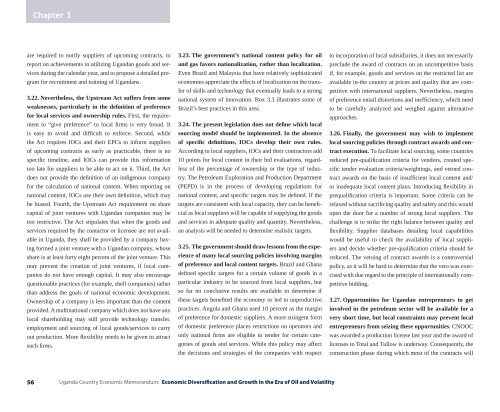Economic Diversification and Growth
71mK301zeG0
71mK301zeG0
Create successful ePaper yourself
Turn your PDF publications into a flip-book with our unique Google optimized e-Paper software.
Chapter 3<br />
are required to notify suppliers of upcoming contracts, to<br />
report on achievements in utilizing Ug<strong>and</strong>an goods <strong>and</strong> services<br />
during the calendar year, <strong>and</strong> to propose a detailed program<br />
for recruitment <strong>and</strong> training of Ug<strong>and</strong>ans.<br />
3.22. Nevertheless, the Upstream Act suffers from some<br />
weaknesses, particularly in the definition of preference<br />
for local services <strong>and</strong> ownership rules. First, the requirement<br />
to “give preference” to local firms is very broad. It<br />
is easy to avoid <strong>and</strong> difficult to enforce. Second, while<br />
the Act requires IOCs <strong>and</strong> their EPCs to inform suppliers<br />
of upcoming contracts as early as practicable, there is no<br />
specific timeline, <strong>and</strong> IOCs can provide this information<br />
too late for suppliers to be able to act on it. Third, the Act<br />
does not provide the definition of an indigenous company<br />
for the calculation of national content. When reporting on<br />
national content, IOCs use their own definition, which may<br />
be biased. Fourth, the Upstream Act requirement on share<br />
capital of joint ventures with Ug<strong>and</strong>an companies may be<br />
too restrictive. The Act stipulates that when the goods <strong>and</strong><br />
services required by the contactor or licensee are not available<br />
in Ug<strong>and</strong>a, they shall be provided by a company having<br />
formed a joint venture with a Ug<strong>and</strong>an company, whose<br />
share is at least forty eight percent of the joint venture. This<br />
may prevent the creation of joint ventures, if local companies<br />
do not have enough capital. It may also encourage<br />
questionable practices (for example, shell companies) rather<br />
than address the goals of national economic development.<br />
Ownership of a company is less important than the content<br />
provided. A multinational company which does not have any<br />
local shareholding may still provide technology transfer,<br />
employment <strong>and</strong> sourcing of local goods/services to carry<br />
out production. More flexibility needs to be given to attract<br />
such firms.<br />
3.23. The government’s national content policy for oil<br />
<strong>and</strong> gas favors nationalization, rather than localization.<br />
Even Brazil <strong>and</strong> Malaysia that have relatively sophisticated<br />
economies appreciate the effects of localization on the transfer<br />
of skills <strong>and</strong> technology that eventually leads to a strong<br />
national system of innovation. Box 3.3 illustrates some of<br />
Brazil’s best practices in this area.<br />
3.24. The present legislation does not define which local<br />
sourcing model should be implemented. In the absence<br />
of specific definitions, IOCs develop their own rules.<br />
According to local suppliers, IOCs <strong>and</strong> their contractors add<br />
10 points for local content in their bid evaluations, regardless<br />
of the percentage of ownership or the type of industry.<br />
The Petroleum Exploration <strong>and</strong> Production Department<br />
(PEPD) is in the process of developing regulations for<br />
national content, <strong>and</strong> specific targets may be defined. If the<br />
targets are consistent with local capacity, they can be beneficial<br />
as local suppliers will be capable of supplying the goods<br />
<strong>and</strong> services in adequate quality <strong>and</strong> quantity. Nevertheless,<br />
an analysis will be needed to determine realistic targets.<br />
3.25. The government should draw lessons from the experience<br />
of many local sourcing policies involving margins<br />
of preference <strong>and</strong> local content targets. Brazil <strong>and</strong> Ghana<br />
defined specific targets for a certain volume of goods in a<br />
particular industry to be sourced from local suppliers, but<br />
so far no conclusive results are available to determine if<br />
these targets benefited the economy or led to unproductive<br />
practices. Angola <strong>and</strong> Ghana used 10 percent as the margin<br />
of preference for domestic suppliers. A more stringent form<br />
of domestic preference places restrictions on operators <strong>and</strong><br />
only national firms are eligible to tender for certain categories<br />
of goods <strong>and</strong> services. While this policy may affect<br />
the decisions <strong>and</strong> strategies of the companies with respect<br />
to incorporation of local subsidiaries, it does not necessarily<br />
preclude the award of contracts on an uncompetitive basis<br />
if, for example, goods <strong>and</strong> services on the restricted list are<br />
available in-the country at prices <strong>and</strong> quality that are competitive<br />
with international suppliers. Nevertheless, margins<br />
of preference entail distortions <strong>and</strong> inefficiency, which need<br />
to be carefully analyzed <strong>and</strong> weighed against alternative<br />
approaches.<br />
3.26. Finally, the government may wish to implement<br />
local sourcing policies through contract awards <strong>and</strong> contract<br />
execution. To facilitate local sourcing, some countries<br />
reduced pre-qualification criteria for vendors, created specific<br />
tender evaluation criteria/weightings, <strong>and</strong> vetoed contract<br />
awards on the basis of insufficient local content <strong>and</strong>/<br />
or inadequate local content plans. Introducing flexibility in<br />
prequalification criteria is important. Some criteria can be<br />
relaxed without sacrificing quality <strong>and</strong> safety <strong>and</strong> this would<br />
open the door for a number of strong local suppliers. The<br />
challenge is to strike the right balance between quality <strong>and</strong><br />
flexibility. Supplier databases detailing local capabilities<br />
would be useful to check the availability of local suppliers<br />
<strong>and</strong> decide whether pre-qualification criteria should be<br />
reduced. The vetoing of contract awards is a controversial<br />
policy, as it will be hard to determine that the veto was exercised<br />
with due regard to the principle of internationally competitive<br />
bidding.<br />
3.27. Opportunities for Ug<strong>and</strong>an entrepreneurs to get<br />
involved in the petroleum sector will be available for a<br />
very short time, but local constraints may prevent local<br />
entrepreneurs from seizing these opportunities. CNOOC<br />
was awarded a production license last year <strong>and</strong> the award of<br />
licenses to Total <strong>and</strong> Tullow is underway. Consequently, the<br />
construction phase during which most of the contracts will<br />
56<br />
Ug<strong>and</strong>a Country <strong>Economic</strong> Memor<strong>and</strong>um: <strong>Economic</strong> <strong>Diversification</strong> <strong>and</strong> <strong>Growth</strong> in the Era of Oil <strong>and</strong> Volatility


